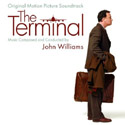
John Williams
The Terminal OST
Decca
Composer John Williams has been in the film scoring business for so long now that for him turning out a new soundtrack is about as effortless and humdrum – almost depressingly so – as the process of giving birth in the satirical Catholic family of Monty Python’s The Meaning of Life.
The niggling problem with Williams’s prolific (or profligate) creative seeds is that for the past two decades they are not half as sacred as those Catholic sperm. The Terminal soundtrack is by anyone’s standards capable, polished and relevant to the Steven Spielberg film that occasioned it; but there is some readily identifiable characteristic of the work that goes beyond matters of Williams’s personal style or idiosyncrasies. It has to do with formulaic sameness, the work of talent on autopilot. The music composed for The Terminal is the music for Harry Potter is the music for Catch Me If You Can, and so on down the line, like a regiment of chocolate soldiers.
E.T., Jaws, Star Wars, Raiders of the Lost Ark: those were Williams’s heyday successes, original and distinctive because he may still have felt like he had something to prove. His scores not only came to define those films, they also enjoyed a kind of autonomous life, too – cultural/musical icons in their own right, like Grieg’s Morning Mood or Barber’s Adagio for Strings. The Terminal soundtrack does neither. It leans on the film like an existential crutch. Separate the two, and it loses all significance. What is it, then? Wearyingly repetitive, watered down klezmer? The Best Romantic Classics… Ever! (Volume 12)?
Put in its proper context, however, the score doesn’t come off much better, because it sounds as contrived and hyper-sentimental as the worst of its genre. Without even having seen The Terminal, listeners will be able to use the soundtrack to pinpoint the precise moment when the protagonist (Viktor Navorski by name, though details are largely irrelevant because Tom Hanks’s character is a simple Hollywood type) is in love, aimless, nostalgic, threatened or disoriented. Of course, it is the responsibility of the music to proffer these aural cues, else there would be no need for it. But it is when the score provides pure and unmistakable emotional cues that it crosses the unforgivable line into the manipulative. In other words, it’s one thing to have the onscreen action complemented by the score; it’s something else to be told exactly what to feel. The utter lack of ambiguity in Williams’s music, exemplified so well by The Terminal, means it is always guilty of the second of the two. This scene is quirky. That one is romantic. This incident is funny. That one is unfair. Don’t think about any of it – just follow your heartstrings in whatever direction Williams and his orchestra happen to tug them.
Fans of the movie – and I’m not here to discuss their questionable taste in cinema, only the weak soundtrack to a weak film – would be better off buying Benny Golson’s Terminal 1, released to coincide with the tenor saxophonist’s cameo in The Terminal. The various tunes on the Golson disc have the specific qualities that make them applicable to the events in the movie (if you want to listen to them that way) as well as the universal qualities that give them a life beyond it. Williams’s official soundtrack can only deliver the specific, and only in ways that cater to those in need of constant emotional guidance.
The Terminal: http://www.theterminal.com • Universal Classics: http://www.universalclassics.com












